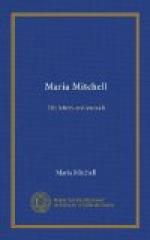A graduate writes: “Her personality was so strong that it was felt all over the college, even by those who were not in her department, and who only admired her from a distance.”
Extract from a letter written after her death by a former pupil: “I count Maria Mitchell’s services to Vassar and her pupils infinitely valuable, and her character and attainments great beyond anything that has yet been told.... I was one of the pupils upon whom her freedom from all the shams and self-deceptions made an impression that elevated my whole standard, mental and moral.... The influence of her own personal character sustains its supreme test in the evidence constantly accumulating, that it strengthens rather than weakens with the lapse of time. Her influence upon her pupils who were her daily companions has been permanent, character-moulding, and unceasingly progressive.”
President Taylor, in his address at her funeral, said: “If I were to select for comment the one most striking trait of her character, I should name her genuineness. There was no false note in Maria Mitchell’s thinking or utterance....
“One who has known her kindness to little children, who has watched her little evidences of thoughtful care for her associates and friends, who has seen her put aside her own long-cherished rights that she might make the way of a new and untried officer easier, cannot forget the tenderer side of her character....
“But if would be vain for me to try to tell just what it was in Miss Mitchell that attracted us who loved her. It was this combination of great strength and independence, of deep affection and tenderness, breathed through and through with the sentiment of a perfectly genuine life, which has made for us one of the pilgrim-shrines of life the study in the observatory of Vassar College where we have known her at home, surrounded by the evidences of her honorable professional career. She has been an impressive figure in our time, and one whose influence lives.”
INTRODUCTORY NOTE
On the 17th of December, 1831, a gold medal of the value of twenty ducats was founded, at the suggestion of Professor Schumacher, of Altona, by his Majesty Frederic VI., at that time king of Denmark, to be awarded to any person who should first discover a telescopic comet. This foundation and the conditions on which the medal would be awarded were announced to the public in the “Astronomische Nachrichten” for the 20th of March, 1832. The regulations underwent a revision after a few years, and in April, 1840 ("Astronomische Nachrichten,” No. 400), were republished as follows:
“1. The medal will be given to the first discoverer of any comet, which, at the time of its discovery, is invisible to the naked eye, and whose periodic time is unknown.
“2. The discoverer, if a resident of any part of Europe except Great Britain, is to make known his discovery to Mr. Schumacher at Altona. If a resident in Great Britain, or any other quarter of the globe except the continent of Europe, he is to make his discovery known directly to Mr. Francis Baily, London. [Since Mr. Baily’s decease, G.B. Airy, Esq., Astronomer Royal, has been substituted in this and in the 7th and 8th articles of the regulations.]




